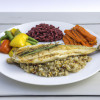
Eating a healthy and balanced diet is crucial for any athlete to perform at their best. One diet that has been praised for its health benefits is the Mediterranean diet. Not only can this diet lower the risk of chronic diseases, but it can also enhance athletic performance. In this article, we will explore the benefits of a Mediterranean diet for athletes.
What is a Mediterranean Diet?
A Mediterranean diet is a way of eating that is based on the traditional foods and patterns of eating in countries bordering the Mediterranean Sea. It emphasizes eating plant-based foods, such as fruits, vegetables, whole grains, legumes, and nuts. It also encourages the consumption of fish and seafood, poultry, eggs, and dairy in moderation, while limiting the intake of red meat.
Improved Energy Levels
Athletes require high levels of energy to fuel their workouts and competitions. The complex carbohydrates found in the Mediterranean diet provide a steady supply of energy throughout the day. Additionally, the healthy fats found in foods such as olive oil and nuts can help maintain energy levels and reduce fatigue.
Reduced Inflammation
Inflammation is a natural response to injury or illness, but chronic inflammation can be detrimental to an athlete’s performance. A Mediterranean diet is rich in anti-inflammatory foods, such as fatty fish, leafy greens, and whole grains. These foods can help reduce inflammation in the body, aiding in the recovery process after exercise.
Improved Cardiovascular Health
The Mediterranean diet is known for its heart-healthy benefits. Studies have shown that this eating pattern can reduce the risk of heart disease, stroke, and high blood pressure. For athletes, this means improved cardiovascular health, leading to increased endurance and performance.
Faster Recovery Times
After a strenuous workout or competition, an athlete's body requires nutrients for recovery. The Mediterranean diet provides a variety of nutrient-dense foods, including fruits and vegetables, whole grains, and lean protein sources. These foods can help the body recover faster and reduce muscle soreness and fatigue.
















